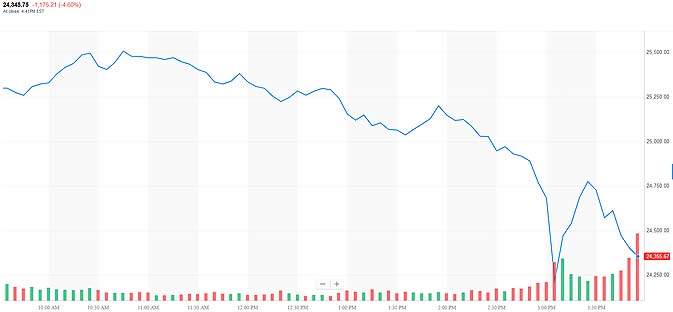On Monday, the Dow dropped 1,175 points, following Friday’s drop of 666 points. Today’s historic losses mark the largest single-day decline the markets have ever seen. At one point, the market was down a staggering 1,600 points before a brief rally at the end of the day.

While stock market volatility doesn’t necessarily signal a coming crash of the market, predictions of a crash are inevitable – especially by those who want to see this President fail. That alone should be worried since there are some in this country who seem like they are willing to let the whole system crash just to get their way politically.
In fact, there has been speculation that the Federal Reserve may be quietly pushing a stock market crash to take down the president.
Peter Schiff, CEO of Euro Pacific Capital, told TheStreet the “[Janet] Yellen put” in the markets could expire under President Trump. “I don’t know if the Fed has much love for Trump,” he said, adding that the Fed had the markets’ back during the Obama Administration.
“Maybe the Fed would be happy to see a bear market that could be blamed on Trump.” Schiff thinks the markets could easily correct 20%.
Should we be Worried about Today’s Flash Crash?
I don’t think we are hitting 2008 territory; but, with that being said, many of the problems that lead to the 2008 crash have never been corrected, and the country is still sitting at over $20 trillion in debt. But it gets worse; the U.S. Treasury Department announced this week that they are on track to borrow nearly $1 trillion this fiscal year.
The Treasury forecasts borrowing over $1 trillion in 2019 and over $1.1 trillion in 2020.
It’s not Just the Government; Consumer Debt is out of Control
The American public owes a total of $3.8 trillion in consumer debt, with, U.S. revolving consumer debt reaching an all-time high of $1.023 trillion.
“We are still a significant way from a problem in household credit,” Moody’s chief economist Mark Zandi says. “Subprime auto and retail card lenders had been aggressive in extending credit, but both have responded to an erosion in credit quality over the past year by tightening down on standards, and loan growth is slowing sharply.”
- A recent report from CareerBuilder shows that 78 percent of full-time working Americans are living paycheck-to-paycheck.
- 1 in 4 workers does not set aside any savings each month.
- 46% of Americans say they have more credit card debt than savings.
Once again, not only has our government forgot the lessons of 2008, but it seems the public has as well.








I don’t remember who said it but, That we shall forget the past we are doomed to repeat it